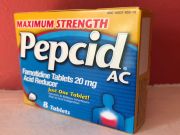THURSDAY, June 4, 2020 (HealthDay News) — An over-the-counter heartburn remedy is showing some potential as a symptom reliever for COVID-19, a small study finds.
Famotidine, sold under the brand name Pepcid, appeared to improve symptoms in a group of 10 patients diagnosed with COVID-19, researchers reported online June 4 in the journal Gut.
The patients’ self-reported symptoms began to feel better within a day or two of taking famotidine, the study authors said.
“A clinical trial is now needed to formally test if famotidine works against COVID-19,” said lead researcher Dr. Tobias Janowitz, a medical oncologist and cancer researcher with Cold Spring Harbor Laboratory in New York.
But don’t rush out to stock up on Pepcid just yet, warned Dr. Amesh Adalja, a senior scholar with the Johns Hopkins Center for Health Security in Baltimore.
“This is a very small study that was observational in nature,” Adalja said. “It is very hard to draw any conclusions from it.”
A clinical trial in which Pepcid’s effectiveness is compared against a placebo is essential to prove that the medication works, since it is being used in mild to moderate cases of COVID-19, Adalja said.
“These are mild cases and mild cases do get better over time, so these cases have to be compared to placebo in order to see if this was actually just the natural course of infection or the famotidine,” Adalja explained.
Famotidine is an H2 blocker, a type of heartburn medication that works by decreasing the amount of acid the stomach produces.
Early in the outbreak, doctors found that many older people in Wuhan, China, who survived COVID-19 had been taking heartburn medications, researchers said.
Reviewing patient records, the investigators found that survivors suffering from chronic heartburn had been taking Pepcid rather than the more expensive omeprazole (Prilosec), Northwell Health Feinstein Institutes for Medical Research president Dr. Kevin Tracey told the Science journal in April.
Hospitalized COVID-19 patients who’d been taking Pepcid were dying at about half the rate of those not taking the drug, 14% versus 27%, Tracey said.
Janowitz said, “Patients who were taking this medication coincidentally were having less severe COVID-19.”
For the new study, Janowitz and his team used a symptom tracking method used for patients with cancer, in which sick people chart how they’re feeling day by day.
The group in the study included six men and four women ranging in age from 23 to 71. They came from a diverse range of ethnic backgrounds, and most had chronic health conditions that increase a person’s risk of severe COVID-19.
The researchers developed a 4-point scale for five common COVID-19 symptoms, and the patients scored those symptoms every day.
Nearly all patients reported improvement in these symptoms after taking famotidine — cough, fatigue, headaches, loss of smell or taste, and shortness of breath, the researchers said.
Five patients also reported that their body aches improved after they began taking famotidine, and three felt less chest tightness, the study findings showed.
“This method of quantifying symptoms and tracking them over time, which we use in cancer medicine, may be of help to understand the natural course of COVID-19,” Janowitz said.
A clinical trial of famotidine’s effectiveness with COVID-19 is underway at Northwell Health in New York City, Tracey noted.
Janowitz said that he could not say why famotidine appears to help patients with COVID-19 symptoms, nor could he say whether other heartburn drugs in its class might also work.
Theoretically, the drug is structured in a way that it might hamper coronavirus from replicating, Tracey told Health.com. Famotidine might bind to an enzyme needed by the virus to replicate itself.
Clinical trials and more lab work will be needed to shed more light on the way the drug might work, Adalja concluded.
“It is also important to look at viral loads or other biomarkers to determine if there is objective evidence that an antiviral or immune-modulatory effect is being exerted by the drug,” Adalja said. “At best, this is hypothesis-generating, and further use of the drug for this purpose should await a randomized, controlled trial to understand whether there is an actual benefit.”
More information
The U.S. Centers for Disease Control and Prevention has more on COVID-19.
Copyright © 2026 HealthDay. All rights reserved.

